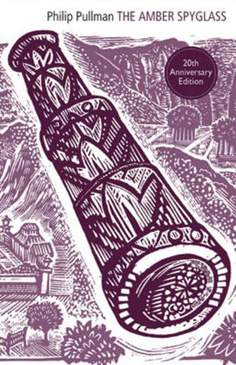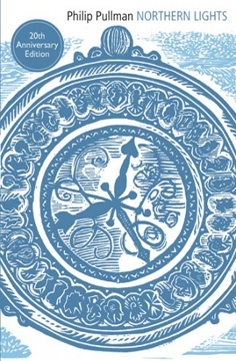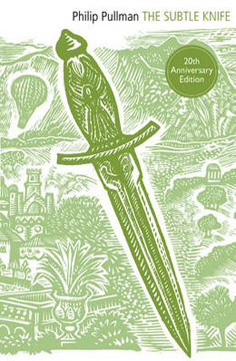I started reading this trilogy back in February. I read the first two fairly quickly, then took a small break before tackling this lengthy final volume. My initial impression was that it had a very different feel to the first two. But as I kept reading and thinking about the stories and getting more of a feel for how this one was going, my feeling on this changed. I started to think about how different the first two had been from each other in many ways, and that this one was actually feeling more like the first book again.
The Northern Lights created a wonderful, fantastical world, populated with amazing characters such as the armoured bears, the witches, the Gyptians and dæmons. Then The Subtle Knife seemed to move to a more prosaic setting, with its main focus shifting to Will and to the nature of elementary particles. There were a few fantastic elements, such as some glorious scenes with the witches and the ability to move between worlds, but these were thinly spread. Will’s problems seemed darker than Lyra’s (at least at first), the book was more violent, but the action was mostly in our world or in Citigazze which seemed very much like our world in many ways.
The Amber Spyglass starts with each chapter shifting to a new location and different characters, but gradually all of these separate storylines converge. And we are back to new marvels, such as the world inhabited by the Mulefa, and the introduction of the Gallivespians. One thing which doesn’t change however is the strong bond between Lyra and Will. This only increases as the book progresses, and of course becomes one of the most important aspects of the book.
I found myself reminded of other stories as I read. For example, the forges beneath Lord Asriel’s fortress brought to mind Saruman’s fortress at Isengard. And of course, there are obvious parallels to the Biblical story of the temptation of Adam and Eve. I enjoyed the variants on this story, especially the Mulefa version. The story Atal tells Mary shows that the gaining of wisdom led to the foundation of a happy and stable society, with the female who initially listened to the snake and followed his advice to gain knowledge was remembered as bringing a great gift to the Mulefa. This provides a contrast to the Consistorial Court of Discipline in Lyra’s world (that is, the Inquisition) who view Eve as the cause of all sin. At the end of the book, Pullman acknowledges the influence of Paradise Lost on his story, but as I’ve never read that, I can’t comment on any parallels to that story.
One aspect of the series I really liked was the way that Pullman explored the idea of people not being defined as simply good or evil. The characters from the Church, the ones who become the main bad guys
of the story see everything as binary – you are either good or bad and there is no way to change this. However, most of the other characters in the story are more complex and change over the course of the books. Mrs Coulter is shown as absolutely evil in the first two books, but changes in the third to act selflessly at times. Similarly, Lord Asriel appears to be obsessed only with his discoveries but is then shown to have been pursuing a grand plan to destroy hierarchical religion and bring on an age of enlightenment. And finally, he also acts out of love to sacrifice himself, not knowing how this will impact his battle. Will and Lyra are the good guys
of the story, but they each have flaws which they have to acknowledge and learn from. In contrast to them is the ghost of a monk who cannot see the that land of the dead is not the heaven he claims it to be, but a place of nothing. A place that both the good and wicked come to languish forever, with no hope of freedom, or joy, or sleep or rest or peace.
As much as I loved most of this book, I was disappointed in the end. There were these battles happening on a grand scale, then they all flickered out. We had the climatic confrontation between enlightenment (represented by Asriel) and authority (represented by Metatron), but no one was there to witness it. Lyra and Will do manage to free the Authority, but they do it without knowing who or what he is, and he dissolves into the world without knowing what became of him. There would seem to be no reason for the Church to change at all, because as far as any of them know, nothing has happened to their god. Perhaps that is the point – they have continued in their beliefs for centuries without any understanding of the nature of their god, and their minds are so set that they wouldn’t change even with proof that their god had been destroyed. It must be left up to people to think for themselves and to decide how they should live.
It feels odd to say this of such a long book, but it felt rushed at the end, and I thought it needed a few more chapters to properly round out the story. In a trilogy where it seemed that the consequences of any action were routinely faced, at the end we never got to see the consequences for the final actions. This is why my rating for this final volume dropped to 4 stars.
Overall though I would highly recommend this book, and especially this trilogy. And I’m looking forward to starting the first book in the new Book of Dust series soon.

 RSS Feed
RSS Feed Facebook
Facebook Instagram
Instagram YouTube
YouTube Subscribe to our Newsletter
Subscribe to our Newsletter





No one has commented yet. Be the first!